DK Hari & DK Hema Hari
If we ask the question – “Why is our land called Bharat?”, one of the most common answers will be that it is named after King Bharat, who was the son of Shakuntala and King Dushyant. King Bharat was the progenitor of the Bharata dynasty, a Lunar, Chandravamsa lineage in which came the Pandava and Kaurava, the battle between whom came to be called the Mahabharata.
If we probe further, we will get another reply that this land is called Bharat after the great Rishi Bharatamuni, the composer of Natyasastra, the foundational work for dance, drama, music and other forms of fine art.
Go further and it will lead us to the story of the great sage Jada Bharata and before him, to the King Bharata who was the son of King Rishabh Dev, an Ikshvaku King. This king, Rishabh Dev is also revered as the first Tirthankar, Bhagavan Adinath in the Jain tradition. King Bharata took over the rule of Ayodhya when his father retired.
He then went on to conquer the rest of the land and is described as one of the early Chakravartin of this land i.e. one who had ruled the land from one coast to the other. The land Bharat is hence said to have got its name after this king. In this Puranic legend and in the geography of Ayodhya, we see a beautiful twinning of early Puranic and Jain legends.
We also have had Prince Bharat, who was the brother of Raja Ram of Ayodhya during Ramayana times.
This land has thus had many illustrious personages who have been called Bharat.
All this raises the question, why were there so many great souls called Bharat, such that the name of this land can be attributed to them?
An Answer To Relish
To unravel this answer, one must try to understand the name “Bharat”. The beauty of the names in this civilization are such that, they are laden with meanings. “Bharat” is one such word which connotes several meanings from an etymological, literal, metaphorical, physical as well as factual perspectives.
An Etymological And Metaphorical Connect
Bha is a syllable that denotes light. It is the root in names such as Bhaskara for Sun, Bhanumati which is also connected with the Sun, Bhanu for its splendour, lustre etc. Light is connected with knowledge and enlightenment. It is apt that the words ignorance and knowledge are metaphorically described as darkness and light.
For, when it is dark, one cannot see anything. For all practical purposes, that thing does not exist or its existence is not known to us. We are ignorant about its existence. We are literally “in the dark” about its existence.
It is only when light falls on anything, can one see that thing. That is when, we being to see it and know of its existence. We begin to “see light” about it. Hence light has an innate connotation of knowledge or enlightenment too.
If we look at the syllable Ra, it denotes that which is desirable, charming, pleasing. That, which radiates charm and attracts attention. From this, we get words and names such as Rama for one who is the charming one, Ramya for one who is pleasing, charming etc.
We also have Rati for one who is full of delight or delightful to the senses. Rati is the name that has been aptly given to the consort of Manmatha, Kama Deva, the divinity for Love and Desire.
Rati thus connotes that which is to be relished.
Bharat or Bharati therefore connotes one who is a connoisseur of knowledge, who relishes knowledge, seeks out knowledge.
This land is thus, one where people have been seekers and relishers of knowledge from time immemorial and this is why many great personages and Kings were named Bharat and the land continued to be called Bharat after them and upon the innate character of its people to seek and relish knowledge.
Bharat is a land where people are connoisseurs of knowledge.
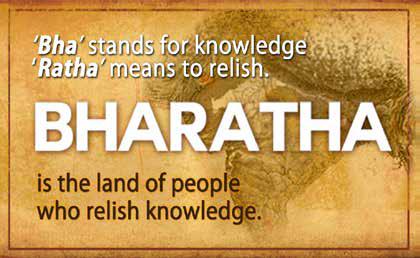
A Factual and Physical Connect
If we notice, we will see that this land does indeed enjoy the physical Bha, the actual sunlight, in abundance too.
Hence Bharat also denotes that land in the world which enjoys sunlight and the bounty that the Sun has to offer.
This is bound to raise the question then, “what about other lands in the world?”. Do not other lands also enjoy the bounties from the Sun?
Even though there are many lands near the equator, this land of Bharat has the advantages:
- of being a fairly big mass of land as against many of the islands along the equator
- of having topological features that aid good rains as well as flow of rivers crisscrossing the land
- of receiving seasonal and copious monsoons, as against brief daily rains like equatorial regions
- of receiving these rains, just after the scorching Summer so that there is both ample water and a cooler weather to cultivate good harvests.
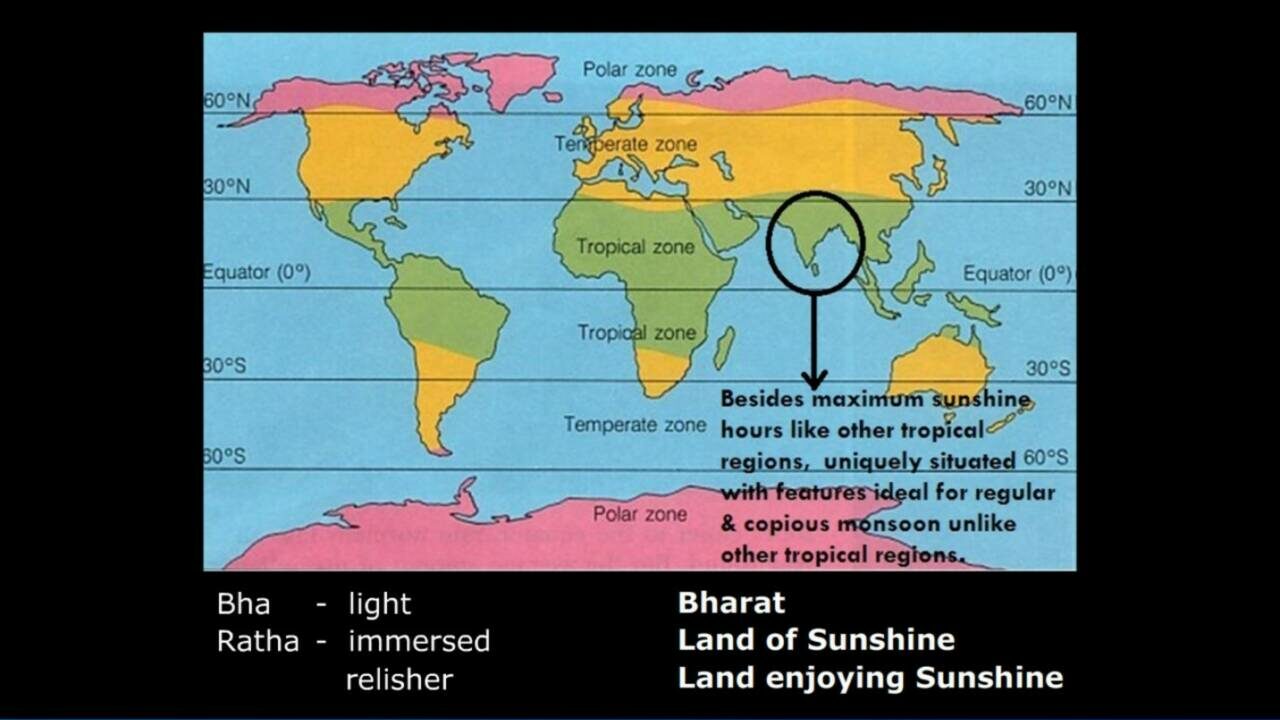
This land, thus enjoys the right amount of sunshine, Bha, neither too hot for long nor too cold for long and just ideal for most of the year. Many other lands in this tropical belt are either deserts, dense rainforests or smaller islands.
This civilization had learnt how to relish this Sunlight and the seasonal Rains that it ushers. They had mastered the art of responsibly harvesting these bounties to cultivate sustainably and produce sufficiently for their own consumption as well as for world trade. All of which, earned them sustained prosperity for millennia. For, they were sought after for their produce and were world leaders in manufacture and trade for millennia.
Even today, we are a leader in harnessing Solar energy in the world. Bharat is also a land where people are experts and connoisseurs of harnessing Sunlight.
A Metallic Tone To The Name
Besides these perspectives to the name Bharat, there is yet another meaning that can be attributed to the name Bharat. One of the aspects that this civilization has been known for, across millennia, is its prowess in metallurgy –
- for producing the world’s best quality, iron and high carbon steel
- for forging out high end steel products
- for smelting Zinc
- for high quality alloying – especially with Copper, Tin, Zinc to produce fine bronze, brass etc.
- for being able to cast, sculpt and forge these metals and alloys into beautiful artefacts, vessels, instruments, tools and weapons.
- for handling poisonous elements such as mercury, lead etc. and putting them to fruitful uses after detoxifying them etc. to name a few.
It was metallurgy, which was one of the most sought-after produces from this land and had earned this civilization much acclaim as well as wealth through trade from all across the land.
Metallurgy and Pottery in this land can be traced to one of the Rishi called Bhrgu. His very name with the syllable Bhr connotes the effulgence of fire as well as sound made by the wind of fire / flame. Flame needed to smelt and wind are closely connected with metallurgy through bellows, bastrika. It is from Bhrgu that we also get words and names such as Bhargo, Bhargav, Bhargavi which mean effulgence, radiance, brilliance. Friday, after Venus, the brightest planet as seen from Earth, is also called Bhrguvara.
Thus, the light, radiance of syllable Bha also connotes the effulgence, Bhr from the metallurgical prowess of this civilization.
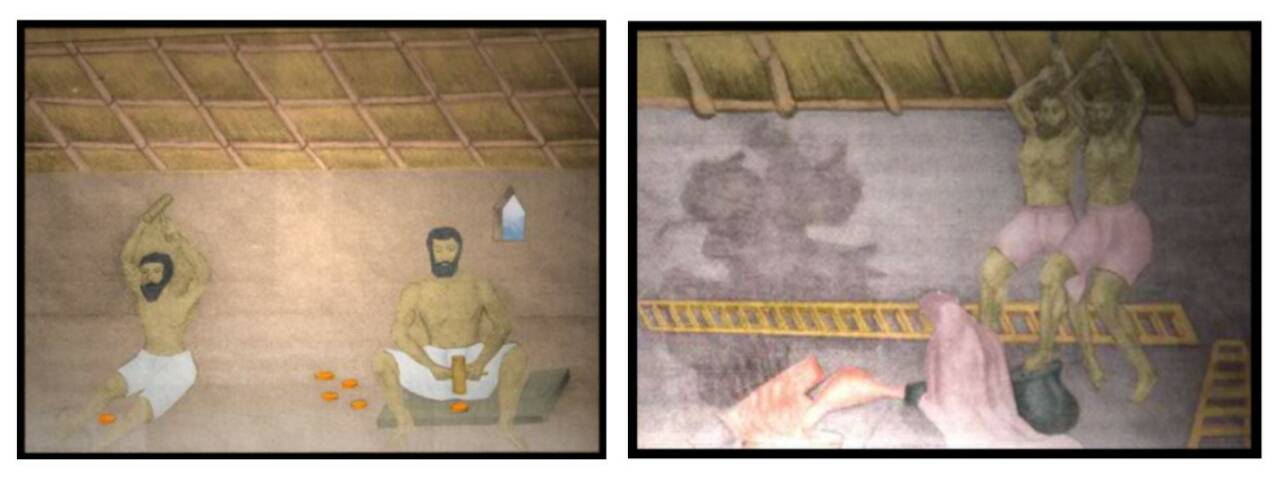
Acknowledgement As A Land Of Knowledge
Anyone can say they are good. Is that sufficient to be taken as a credential? Should not others echo the sentiment too, for it to be true?
Likewise, when a corroboration for this civilization being a land of knowledge, comes from different quarters, it vindicates our ancestors’ choice of the name “Bharat”, for our land and people.
A Chinese Corroboration
The Chinese had attributed different qualities to the major civilizations of the past. In their view, this land was the King of Wisdom. They called this land as Tianzhu meaning Heavenly Centre as they looked towards this land for various texts on Sciences and Buddhism. In Chinese language, India is still known as Tianzhu.
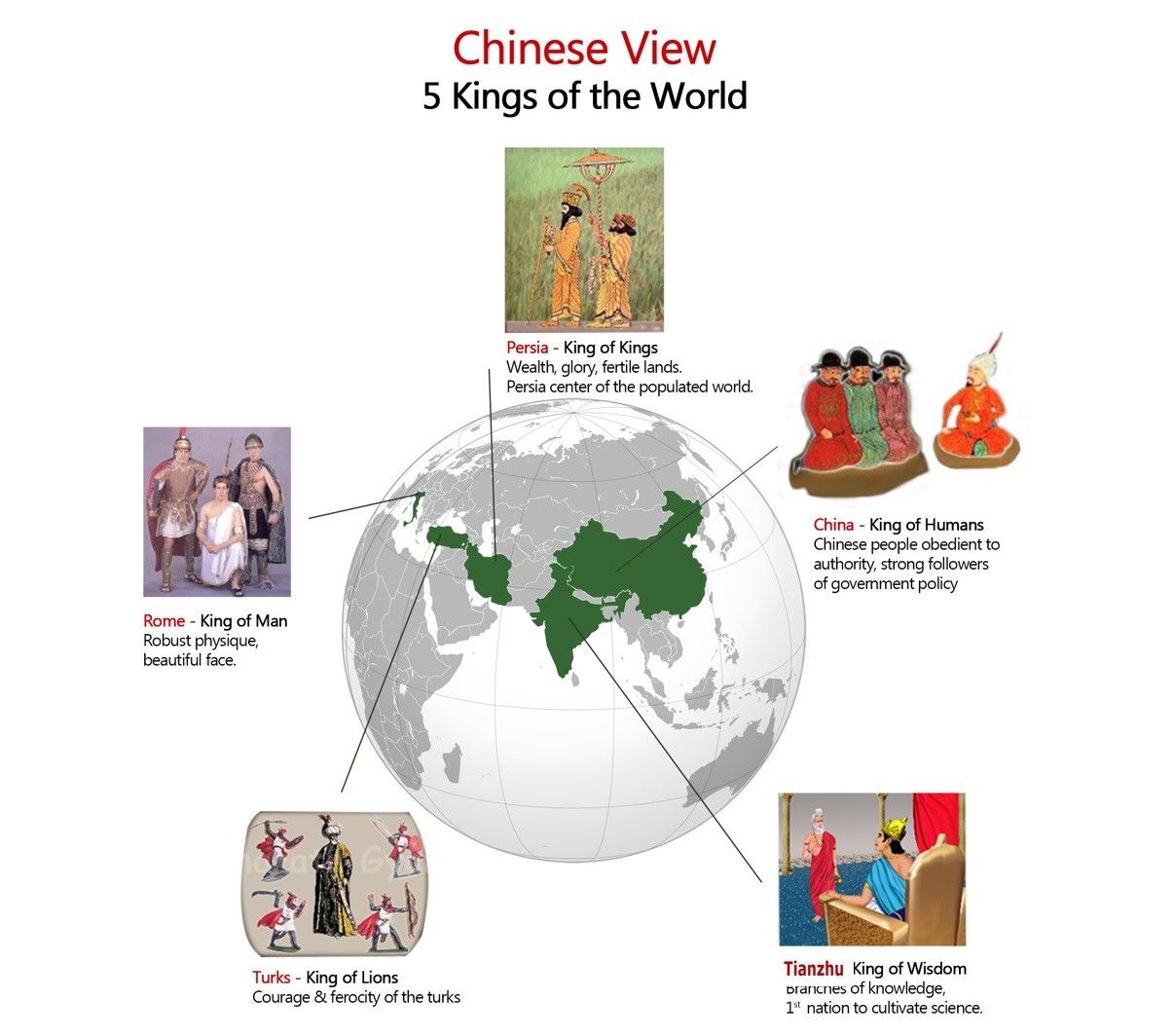
- Al Jahiz of Basra, Baghdad who lived between 716 to 815 CE
- Abu Umar Jahiz, Baghdad, an Arab philosopher in 868 CE
- Yaqubi an Arabic Historian and Geographer from Egypt in 897 CE
- Said Al Andalusi, an Arabic scholar from Andalusia, Spain (Iberia), 1068 CE
All their writings show, how they had regarded the civilization of Bharat as a land of science, philosophy, medicine, astronomy, mathematics, fine arts, sculpture, metals, musical instruments and many more.
A Timeless Name
This name Bharat, can be found all the way back in the Veda and Purana. Rishi Vishwamitra in the Rg Veda, on the civilization of his times, describes the people living in this land in verse no. 3.53.12 as, “Bharatham Janam”.

A Multi-dimensional Name
Thus, the name Bharat has stood for a land:
- famed for its knowledge (Bha)
- nourished by its agriculture enriched by the Sun (Bha)
- rich due to its trade in metals and products forged by the flame (Bha).
- Bharat is the name we had given our land and civilization based on our nature and aspirations.
Most countries are named after people or after their geographical or topological aspects.
It is rare to find a civilization which in time of yore itself had deemed it apt to give itself the name “Bharat” based on the Guna, character of its people – of seeking glow of knowledge, of leveraging glow of sunlight, of handling the glow of fire.
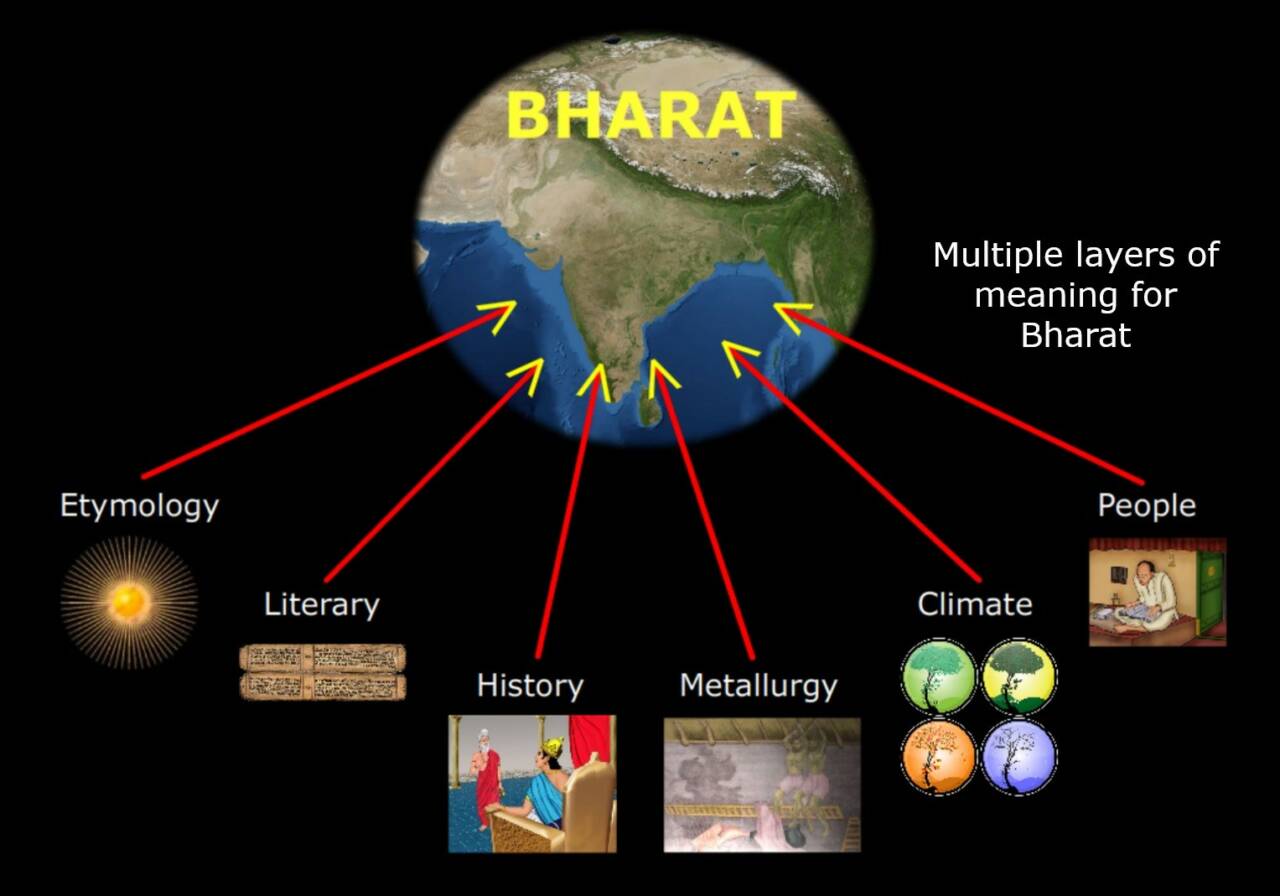
A Resounding and Resonating Name
The integrated, indigenous model which had sustained this civilization in the past, now being rejuvenated for the present, will be one that throws light, knowledge, Bha on the principles of Rata, relishing the bounties offered by Nature in a sustainable, prosperous manner.
Such a thought leadership and practical wisdom is what Bharat can offer and needs to offer to its own people and to the world community at large, to make this world a better place to live in!
Not only will Bharat denote the land where people relished knowledge, but the name “Bharat” will take on a wider meaning in Naya Bharat.
The name “Bharat” will become a brand and stand for a land where people relish the bounties of Nature in an enlightened manner, to achieve sustenance of both self and everything around. All through the times, this civilization has stood for leadership in guiding people on:
- how to understand this world of Science and Nature,
- how to strike a balance with Nature in day to day living and
- how to live Naturally
It is time now, for taking a leaf out of our past, to learn, to put to practice and to propagate the good practices that had made it prosperous and made the world look up to it.
It is time now to gather whatever teachings our ancestors have left behind, in order to model ourselves after a proven model, even if it means daring to be different. Our assured success in becoming self-reliant, Atmanirbhar and Swavrtta, self-sustained, in a wholistic manner, is bound to inspire others to follow.
Prime Minister Narendra Modi says this in his own way as:

It has never been our nature to stay behind and follow others. This civilization has been the leader in every sense of the word and has led the world by example. Bharat is a name that reflects all this and more!
More on these aspects can be found in our books Brand Bharat and Breaking The Myths – About Identity from Bharath Gyan at www.bharathgyan.com.

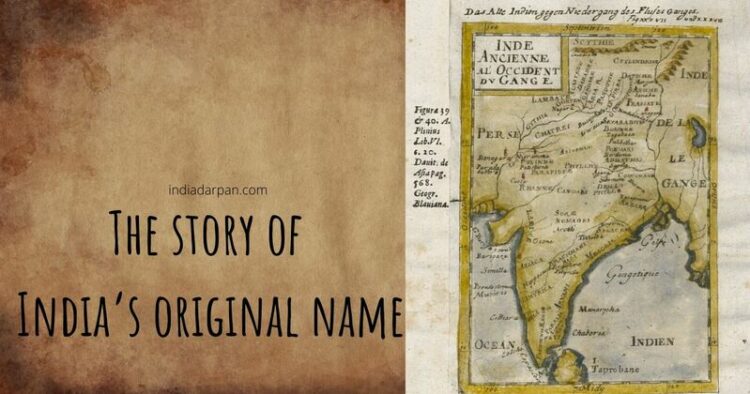


















Discussion about this post